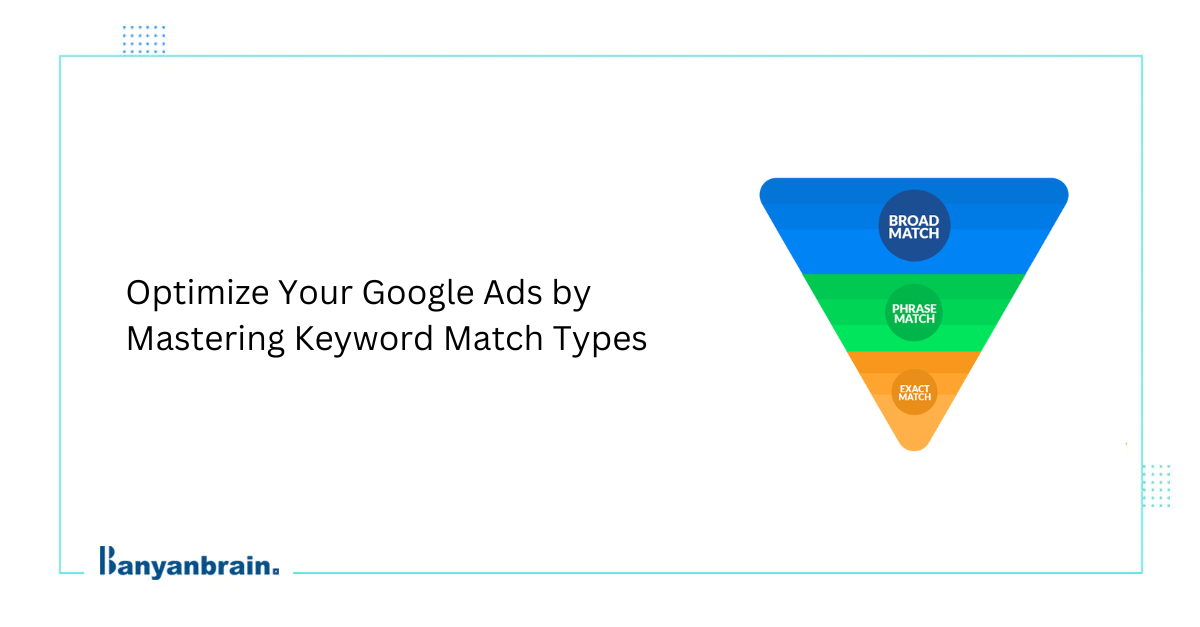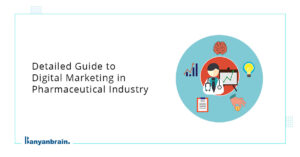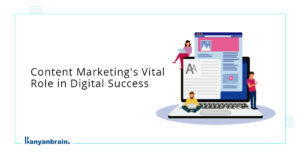For any successful PPC campaign optimization in Google Ads, the right people must be targeted correctly. For this, one of the most important parts is to define the best keyword match types, which indicate how closely a user’s search query needs to resemble your selected keywords for the ads to appear.
You need to choose the right keyword type to fulfill your desired action for your ads that match users’ queries. This also helps you optimize your Google Ads campaign by increasing the revenue rate.
In this blog, we will learn more about keyword match types, why they are essential, and different match type strategies for ROI and selecting the right match types based on campaign goals.
What are keyword match types?
Keyword match types determine the relevance of a user’s search term to a specific keyword. If you want your ad to be mentioned in the auctions, it is important to determine the AdWords keyword type. If a keyword is “motivational books,” then there is a chance that the ad can be shown to the searchers, such as” best motivational books” or “top motivational books.”
Why are keyword match types important?
Advanced keyword match type plays a vital role in Google ads. Let us discuss some of the advantages of using keyword match types:
- Control audience: With the help of keyword match types, you will be able to target a specific group of people or a wide audience according to the needs and demands of the company. You can segment your audience based on demographics, behavior, and interests. This gives you full control over who sees your ads.
- Enhanced performance: If you choose the right match type, you can target the right audience according to your business preferences. You can also use keywords to drive traffic to your website and save some revenue by avoiding irrelevant clicks. This will help improve your website’s performance and let you drive more sales by generating more revenue.
- Save time: Broad match is a default match type, saving time while building keyword lists and allowing the marketer to optimize the campaign.
- Filter out semantically similar terms: Keyword match types filter in semantically similar terms that are sonically similar but unrelated to your ad, thus ensuring that the right people see your ads in real-time.
Different keyword match types
Different keyword match types are mentioned below:
- Broad Match
- Phrase Match
- Exact Match
- Broad Match Modifier (Not in use)
Broad match: Broad match will help you target a vast audience in keyword matches on Google ads. It is the most flexible solution that will help you target an audience and drive more traffic to your website, which will eventually let you generate more sales.
With the effective use of the right keyword research to match keyword types, you can use a vast variety of keywords related to your targeted keywords, including synonyms, phrases, and misspellings. This can help when a person is searching for some keyword match types that don’t look exactly like yours but still lets you target them and make your ad more visible. By doing this, you can target a broader audience and make your website more visible among them.
When to use broad match?
- Broad match keywords are mainly used when people want to target a broader audience and increase website traffic. Because it is the default match type for keywords, and it’s a good option when creating a campaign.
- You can use broad-match keywords to collect data that will let you learn more about what your target audience is searching for and what will work more for your ads, which helps in effective lead generation.
- With the help of broad-match keywords, you can target as many users as possible, even if they don’t search for the exact keyword match types you are using. When you sell various products, related searches for your products may also relate to other products in your line.
Phrase match: The other option with keyword matching in Google Ads is phrase match, thus a balance between targeting and flexibility. To avail of this option, you need to put quotation marks around your keyword to ensure that your ads appear when a search query includes the meaning of that keyword. For example, if you enter “motivational novels” as your keyword, your ad will appear when a user searches for that particular term.
One key aspect of phrase match is that the word order of the search query doesn’t matter unless it changes the keyword match type meaning. Your ad can thus appear for searches that add words or phrases to what’s inside the quotes, such as “best motivational novels.” Phrase match allows you to reach more searches than an exact match and fewer searches than a broad match. It is a very good option for businesses looking to target specific keywords yet are willing to give in to some variation of searches.
When to use phrase match?
If you want to reach more searches than the exact match but fewer than the broad match, phrase match becomes an excellent middle ground as it ensures you can target a specific phrase and get some related search captures. Phrase match also saves time and effort because you don’t have to create a long list of keywords and phrases. This is very handy if you have many keywords or phrases to target.
Exact match:
Exact match keywords are a keyword type that enables you to target people who are searching for the exact term or phrase you are bidding for or similar close variations. This means your ads will only be triggered by searches that match the term you are targeting and slight variations, misspellings, and plurals.
You can target only the search queries that precisely match your keyword. Thus ensuring that your advertisement is in front of the person most likely to search for your offering. This can yield far better ROI on ad spend, as one would not squander his money on irrelevant searches.
Some of the most valuable benefits of exact-match keywords include:
- Control your ad spending: Target only exact-match searches to show ads to users who are likely to be interested in your product or service.
- Increased ROI: It reaches only the most appropriate searches, which may be useful for increasing your ad spend ROI.
- More relevance: The exact match search word helps target searches genuinely related to your service, increasing the conversion rate.
Broad match modifier: Adwords Broad Match Modifier was used earlier instead of a phrase match. This ensured which words to use in a search query for your ad to appear. You sign up to use BMM by enhancing your keywords with a plus sign (+). This means your ad will show close variants of your keywords, including misspellings, abbreviations, synonyms, and different grammatical forms.
BMM has an added advantage that increases clicks and conversions compared to broad matches because it has greater control over them. This gives you a better-targeted reach than the broad match, which puts your ads out there for your keyword. Unlike broad matches, which put your ads out there for your exact keywords, synonyms, and misspelled words, BMM has greater control over them.
Keyword match types for negative keywords
Google Ads has three types of negative keyword matches: broad, phrase, and exact. The type ensures your ad will not show if the search query contains the specified word. For example, the negative keyword “free.” Your ad will not be shown if the search query contains “free” with or without its context. If you are typing a negative keyword such as “coffee shop,” your ad will not be shown if the search query matches the phrase “coffee shop.”
Strategies for selecting the right match types based on campaign goals
One weighs several factors while choosing keyword match types for a campaign. The initial point at which campaign goals come in is to be noted. Some keywords, say broad-match, work well with increasing brand awareness and reach.
The goal also matters here since you’re following a conversion-based bidding strategy. You might find broad matches helpful in producing the maximum conversions and reach. If your bids target impression share, then phrase or exact match is probably a better choice.
Another essential point is that every match type has strengths and weaknesses. The right choice will depend on your campaign goals. Campaign grouping is another critical consideration, whereby campaigns grouped by match type would likely avoid duplication and optimize better. Careful analysis of all these factors would ensure you choose the most effective keyword match type for your campaign.
Companies cannot allow themselves to be left behind in today’s marketplace. Meanwhile, the rest of the world forces the globe to innovate. Today, keyword match types are crucial in attaining online marketing goals for businesses. The right keyword match type can help increase ROI, increase conversions, and reach the target audience most effectively.
Banyanbrain is a top digital marketing company that will help you choose the best keyword match types to increase your business’s ROI. Contact Banyanbrain for services like PPC ads, search engine optimization, and social media management.
FAQs
How to maximize ROI using keyword match types?
Use keyword match types to maximize ROI strategically. Start with a broad match to gather data, then refine campaigns using phrase and exact match types to boost conversion rates. Continuously monitor performance, make bid adjustments, and use negative keywords to filter out irrelevant traffic.
What is the difference between phrase match and broad match?
These two are keyword match types for Google Ads. They include phrase matches, which put quotes around the phrase search that the query must be found within. Another match type is broad, and it triggers ads in relation to a more extensive group of searches containing some of its synonyms and possible variations. Phrase matches should, therefore, be used in targeted campaigns, while broad matches should be used in exploratory strategies.
How do you optimize Google Ads with keyword match types?
Use broad match first for a general idea, then work your way to phrase and use exact match types for more precision. Monitor performance metrics, change bids, and add negative keywords to eliminate any irrelevant searches from the online space. Test your AdWords match-type strategy constantly and refine it in line with changes within the market and consumer behavior.
How do different keyword match types work?
Keyword match types refer to how closely a search query has to match your Google Ads keywords. Broad match is when you allow ads to be shown based on related searches so that you have the highest reach. The phrase match requires that the exact phrase be included for more control. The exact match will only display the ads for the exact queries, and this is where you get the highest level of specificity.
Which keyword match type is the most expensive?
The exact match type is considered the most expensive keyword match type in Google ads because it shows the ads only to searchers who match the keywords exactly. This leads to a higher rate of competition and increased cost-per-click.






